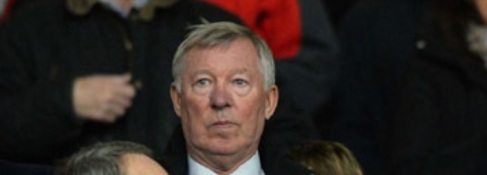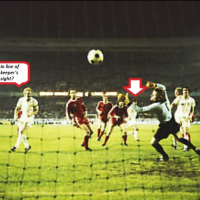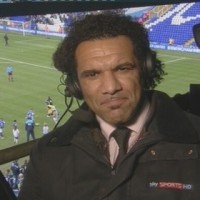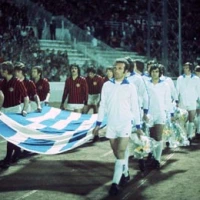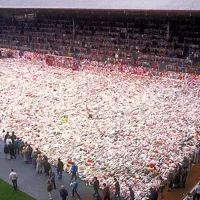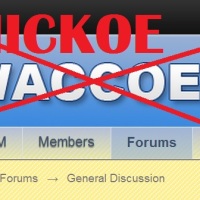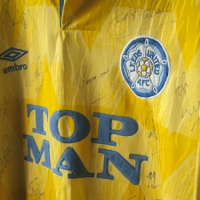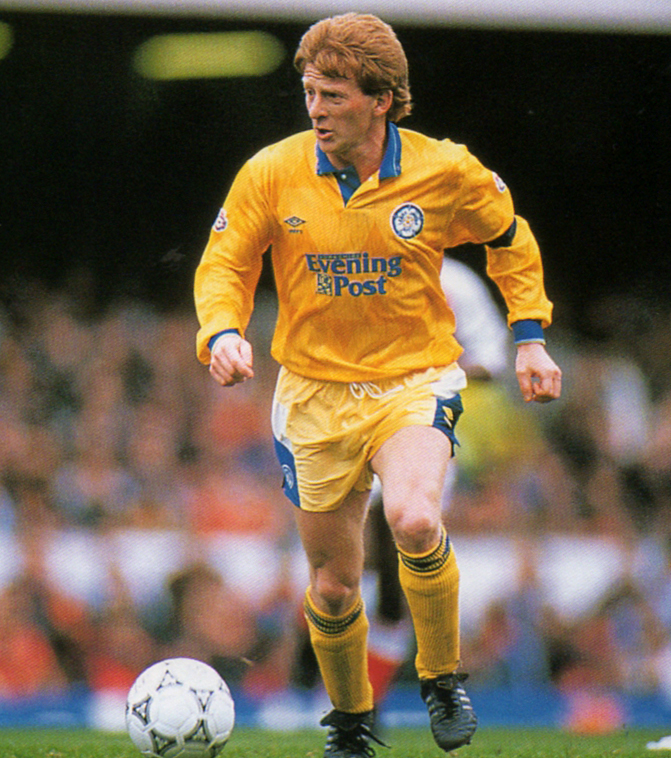
Super Jon Newsome
There’s been a lot of talk this past couple of days about the “Class of ’92”, a somewhat disingenuous reference to Man U’s FA Youth Cup winners of that year, what with Giggsy Wiggsy taking over as temp. manager at the Theatre of Hollow Myths, with Scholesy Wolsey and Butty Wutty on board as well.
The media, bless ’em, love this sort of thing – and they’re seemingly eager to ignore the fact that 1992 was, actually, all about another United – Leeds United, the one and only United – as they won the last ever proper Football League Championship, four points clear of you-know-who and their rabidly frothing Scotch git of a manager.
It all happened 22 years ago today, actually – so let’s have a nostalgic look back and, while we’re at it, set the record straight about all of this “Class of ’92” crap. Because we’re not talking pupils here, we’re talking masters.
The 26th April 1992 was not just a normal Sunday morning like any other; for all fans of Leeds United it would turn out to be a date with destiny, the unlikely culmination of a footballing journey that had started in October 1988. Howard Wilkinson’s move from First Division Sheffield Wednesday to take over as boss at Second Division strugglers Leeds United had been – perhaps unwisely – summed up by the Sheffield Wednesday chairman as “a chance we couldn’t deny Howard to better himself.” That must have fallen like rocks on the ears of the Wednesday fans who nevertheless could not have envisaged their rivals’ subsequent meteoric rise at a time when the Wednesday star was on the wane. Such is life.
History will show that Wilkinson breezed into Leeds United, seized the place by the scruff of its neck and shook it up good and proper. Remnants of his legacy are still visible in the club’s world-class Academy and training complex not to mention the gigantic East Stand, but it is for the phoenix-like resurrection of The Whites that the fanatical Leeds support will best remember Sergeant Wilko. Leeds were promoted in 1990 after Wilkinson’s first full season, trading places with Sheffield Wednesday as they dropped into the Second Division – bittersweet irony there. A season of consolidation followed, and then the full-on assault on the Football League Championship itself, a challenge unexpectedly sustained right to the sweetest of ends. By April 20th 1992, Leeds were still clinging on in the title race, but Man U were clear favourites with a points lead and a match in hand. That day though was the start of the turning of the tide in Leeds’ favour. As fans gathered on the Kop for the late afternoon visit of Coventry City, radios were clamped to anxious ears as news was awaited from Man U’s home game against Nottingham Forest. Two explosions of joy from the swelling Elland Road crowd signalled two Forest goals and a defeat for the leaders that Leeds were to capitalise on, beating Coventry 2-0 in front of a live TV audience.
Now it was game on in earnest, and I vividly remember a nervous evening at home that midweek as West Ham played host to Man U who were finally playing their remaining game in hand. Win, and they would be in the box seat – but, as I frantically tidied and re-tidied my bedside table drawer to save myself from chewing my nails down to my elbows, they lost, wonderfully, miraculously lost to leave Leeds in charge of their own destiny. Choleric Man U manager Alex Ferguson must have bitterly tasted the sourest of grapes as he described the already-relegated Hammers’ effort levels in beating his charges as “obscene”. His lack of grace drew a stark contrast with the phlegmatic Wilko, who was calmly reminding the world that Leeds had secured a place in Europe, his main aim for the season, and that anything more would be “a bonus.”
But Leeds now knew that if they won their last two games – away at Sheffield United and at home to Norwich City – they would be English Champions in the last old-style Football League programme – a signal honour. Everybody thought it would go down to the last game of the season, that Norwich would be the big game. Yet if Leeds were to win at Bramall Lane, Man U would then face the formidable task of winning at Anfield to take the Title race to its last day.
Back to April 26th, and as I walked up the hill into Wakefield that mid-morning, I saw cars trailing the colours of Leeds United, the scarves fluttering bravely – and I felt a sense of occasion but still could not quite comprehend that this might just be The Day. I met up with my mate Dave, and we shared a tense journey to Sheffield, not much said, both knowing that this was a Sunday that could equally easily end up being triumph or disaster. Parked up in the scruffy environs of Bramall Lane, just about the first thing Dave did as we walked to the ground was to drag me back out of the path of a careering van as I stepped out to cross a road, oblivious of traffic, lost in thought. We both grinned at my narrow escape and agreed: good omen. And then we were high up in the seats of the upper tier behind the goal at the away end of Sheffield United’s quaintly ill-designed stadium. The day was gusty, and so the football would prove to be. It was a match of ebb and flow, the Sheffield faithful eager to deny Leeds their chance of clinching the title, Leeds fans loud and defiant with self-belief.
If you’re a Leeds supporter, you’ll have seen the goals from that game hundreds, thousands of time. It plays through now, all these years later, in the Football Highlights studio of my mind; joy for the home side as Alan Cork, gleaming of bald pate, pokes the ball home to give Sheffield the lead. Then, a midfield tussle in the swirling wind, as Leeds try valiantly to come back. A late first-half free kick, which Gordon Strachan races to take before the home defence can set themselves, he finds Rod Wallace in the area who tips the ball past home keeper Mel Rees’s attempt to save, defenders scramble to clear, only to hit Gary Speed who pings the ball back to ricochet off Wallace – into the net. Pandemonium in the away end. Level at half time, we’re breathless with drama and the hurly-burly of it all, raucous with United anthems, nervous of what’s yet to come.
In the second half, though we don’t know it, human tragedy unfolds: Sheffield ‘keeper Mel Rees, injured in the melee leading to Leeds’ leveller, his thigh heavily strapped, can hardly move and is hampered for the second Leeds goal as Jon Newsome stoops to head in at the far post. Mel Rees, who was due an international call-up for Wales the next day but has to pull out because of his injury. Mel Rees, who would never play football again because he was to develop cancer and die a year later, tragically young at 26. RIP Mel Rees.
The crazy game continues crazily. A dangerous ball across the Leeds box is retrieved by home defender and future Leeds man John Pemberton, who turns it back towards the goal-line where Lee Chapman sticks out a leg for an own-goal greeted with horrified stupefaction by the Leeds fans behind the goal and we’re level again. Then enfant terrible Eric Cantona enters the fray, and within a few minutes he is chasing a loose ball into the Sheffield half, with Rod Wallace scampering alongside and home defender Brian Gayle lumbering back in a desperate attempt to clear the danger. And it’s Gayle, former Man City man, who finally slays Man United. From my vantage point at the opposite end of the ground I see him get his head to the ball, and the action is suddenly slow motion. Gayle has headed the ball, poor Mel Rees is stranded far out of his goal, the ball goes over his head in a slow, slow loop, and bounces tantalisingly towards the unguarded net…
Then I’m watching at full speed from the far end as Cantona and Wallace raise their arms in triumph, wheeling away in delight, and even as I wonder what they’re up to I realise that the ball has nestled in the Sheffield United net. A red mist descends, and I am utterly outside of my skull and beside myself in delirious joy and fevered madness, looking around me, roaring like a demented bull, face congested with blood, eyes bulging; I grab a tiny and helpless St John’s Ambulance man by his lapels and scream beer and spittle into his terrified face “Get me some oxygen!!!”, I bellow. “I’m going to have a bloody heart attack!!!” The mad moment passes, I drop the ashen medic and some measure of sanity returns, but we’re still cavorting and diving all over each other, a seething, sweating mass of Leeds, because we know it’s over, we know that Sheffield are beaten, and we know that Man U don’t have an earthly at Anfield, not a prayer. We were going to be Champions; on that windiest and gustiest of days, a Gayle from Manchester City has blown the Scum away and decided in an instant the fate of all three Uniteds from Manchester, Sheffield and Leeds.
And so, of course, it panned out. Later I watched mesmerised on TV as Liverpool beat a demoralised Man U, Denis Law and Ian St John trying to put a brave face on it, Elton Welsby’s foot bobbing away in thwarted anger as the script turned out just as none of them wanted. Ian Rush scored his first ever goal against Them, and it was settled late on as Man U conceded a second. “And now the title goes to Leeds without any doubt at all” intoned Brian Moore in the ITV commentary as I sat there with tears of joy streaming down my unashamed face. Gary Lineker had called into the studio earlier to complain that Rod Wallace’s goal had been offside (it was). St John and Moore bemoaned that Man U had had no luck at all, and Welsby ground his teeth in the studio as the Man U fans outside hurled abuse at him, heedless of the fact that he shared their bitter disappointment. All was frustration in the media and the rest of football and Leeds fans everywhere utterly failed to give a toss.
Twenty-two years on from that nutty day, when Leeds reached the summit of the game, the images are all still vivid and clear for me. I’ve worn out four video tapes and at least three DVD’s, but I don’t need them, I don’t need YouTube, I can see it all any time I choose just by relaxing and closing my eyes. Mel Rees is no longer with us, nor is Gary Speed and Brian Moore has passed away too. Rest in peace, all. And my mate Dave who shared that memorable day with me, he’s gone as well, taken far too young by cancer in 1999. I have a picture of us both, taken before the home game with Norwich a week after we’d won the league, triumphant in our freshly-purchased “Champions” t-shirts, happily blind as to what the future would bring. RIP, Dave mate. We celebrated hard that day as little Rod Wallace won that last game with a sublime goal, rounding off our greatest season. We’d earned it, me and Dave, tramping around the second division grounds of the eighties as Leeds struggled to come back. Thousands of us had earned it. Now we were top dogs, and boy did we enjoy it while it lasted.
United were back, as Champions of England. The Last Real Champions. One of our unique, unbeatable accolades, like being at the top of the League when the Millennium clicked its four digits over. Something that can never be taken away from us: Immortality, pure and simple. Happy Memories, Champs.











